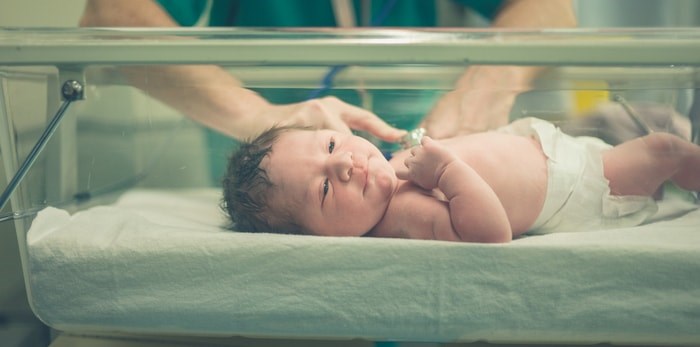 A newborn baby in the hospital/Shutterstock
A newborn baby in the hospital/Shutterstock
B.C. will cease so-called birth alerts that have led to the seizures of infants as young as 90 minutes old from parents deemed to be a danger to their children, the minister of children and family development said Sept. 16.
Katrine Conroy said the alerts have been primarily issued for marginalized women and, disproportionately, Indigenous women.
The alerts were addressed in the final report of the National Inquiry into Missing and Murdered Indigenous Women and Girls released earlier this year.
It said hospital social workers are given a list of women who are pregnant and their due dates and as soon as one of these women entered the hospital to give birth, an alert was activated.
“We acknowledge the trauma women experience when they become aware that a birth alert has been issued,” Conroy said. “We also heard calls to end this practice from Indigenous communities, organizations and the report from the National Inquiry into Missing and Murdered Indigenous Women and Girls.”
The inquiry final report called child apprehensions “a form of violence against the child. It also represents the worst form of violence against the mother. Apprehension disrupts the familial and cultural connections that are present in Indigenous communities, and, as such, it denies the child the safety and security of both.”
The report said birth alerts against Indigenous mothers, including mothers who were in foster or government care themselves, can be the sole basis for the apprehension of their newborn children.
“Birth alerts are racist and discriminatory and are a gross violation of the rights of the child, the mother and the community,” the report said.
The alerts have been used in B.C. Manitoba, New Brunswick, Ontario and Alberta.
Saskatchewan said in March it was working to decrease usage of the alerts.
Literature on the practice said women would avoid going to hospitals to give birth – fearing loss of the child – and not receiving medical care as a result.
Conroy said changes are being made to work with and support high-risk expectant parents to keep newborns safe and families together through a collaborative, rather than an involuntary, model.
Health care providers and social service workers will no longer share information about expectant parents without consent from those parents and will stop the practice of birth alerts,” Conroy said.
B.C. Green Party MLA Sonia Furstenau said in her riding a three-day-old child was taken from a mother without explanation in 2018. The child was, however, ordered returned by a judge.
Furstenau said in a Kamloops case this year, a mother delivered a child by caesarean section only to have the little girl seized by childcare workers 90 minutes later.
“These are examples of deeply damaging actions on the part of government,” Furstenau said. “We need to recognize that the humanitarian crisis of Indigenous child apprehensions will not be stopped by tinkering around the edges of a very broken, non-evidence based system.”
She questioned why it has taken the government so long to end the practice.


